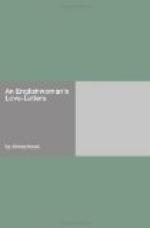There seems to have been a rage at one period for commissioning statues of David: so Donatello and others just turned to and did what they liked most in the way of budding youth, stuck a Goliath’s head at its feet, and called it “David.” Verocchio is the exception.
We are going to get outside Florence for a week or ten days; it is too hot to be borne at night after a day of tiring activity. So we go to the D——s’ villa, which they offered us in their absence; it lies about four miles out, and is on much higher ground: address only your very immediately next letter there, or it may miss me.
There are hills out there with vineyards among them which draw me into wishing to be away from towns altogether. Much as I love what is to be found in this one, I think Heaven meant me to be “truly rural”; which all falls in, dearest, with what I mean to be! Beloved, how little I sometimes can say to you! Sometimes my heart can put only silence into the end of a letter; and with that I let this one go.—Yours, and so lovingly.
LETTER XXXIII.
Beloved: I had your last letter on Friday: all your letters have come in their right numbers. I have lost count of mine; but I think seven and two postcards is the total, which is the same as the numbers of clean and unclean beasts proportionately represented in the ark.
Up here we are out of the deadliness of the heat, and are thankful for it. Vineyards and olives brush the eyes between the hard, upright bars of the cypresses: and Florence below is like a hot bath which we dip into and come out again. At the Riccardi chapel I found Benozzo Gozzoli, not in crumbs, but perfectly preserved: a procession of early Florentine youths, turning into angels when they get to the bay of the window where the altar once stood. The more I see of them, the greater these early men seem to me: I shall be afraid to go to Venice soon; Titian will only half satisfy me, and Tintoretto, I know, will be actively annoying: I shall stay in my gondola, as your American lady did on her donkey after riding twenty miles to visit the ruins, of—Carnac, was it not? It is well to have the courage of one’s likings and dislikings, that is the only true culture (the state obtained by use of a “coulter” or cutter)—I cut many things severely which, no doubt, are good for other people.
Botticelli I was shy of, because of the craze about him among people who know nothing: he is far more wonderful than I had hoped, both at the Uffizi and the Academia: but he is quite pagan. I don’t know why I say “but”; he is quite typical of the world’s art-training: Christianity may get hold of the names and dictate the subjects, but the artist-breed carries a fairly level head through it all, and, like Pater’s Mona Lisa, draws Christianity and Paganism into one: at least, wherever it reaches perfect expression it has done so. Some of the distinctly primitives




